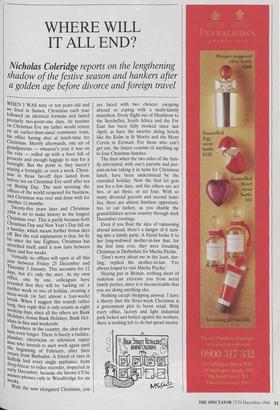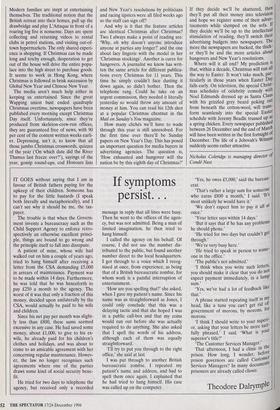WHERE WILL IT ALL END?
Nicholas Coleridge reports on the lengthening
shadow of the festive season and hankers after a golden age before divorce and foreign travel
WHEN I WAS nine or ten years old and we lived in Sussex, Christmas each year followed an identical formula and lasted Precisely two-point-one days. At teatime on Christmas Eve my father would return on an earlier-than-usual commuter train, his office having shut at lunch-time for Christmas. Shortly afterwards, one set of grandparents — whoever's year it was on the rota — rolled up with a boot full of Presents and enough luggage to stay for a fortnight. But the point is, they weren't staying a fortnight, or even a week. Christ- mas in those far-off days lasted from before tea on Christmas Eve until after tea on Boxing Day. The next morning the offices of the world reopened for business, and Christmas was over and done with for another 12 months.
Twenty-five years later and Christmas 1994 is set to make history as the longest Christmas ever. This is partly because both Christmas Day and New Year's Day fall on a Sunday, which means further bonus days off But the real explanation is that, bit by bit since the late Eighties, Christmas has stretched itself, until it now lasts between three and five weeks.
Virtually no offices will open at all this Year between Friday 23 December and Thursday 3 January. This accounts for 12 days, but it's only the start. At my own office, one by one, colleagues have revealed that they will be 'tacking on' a further week or two of holiday, creating a three-week (in fact almost a four-week) long, When I suggest this sounds rather long, they reply that it only counts as eight working days, since all the others are Bank Holidays, bonus Bank Holidays, Bank Hol- idays in lieu and weekends.
. Elsewhere in the country, the shut-down lasts even longer. There is barely a builder, Plumber, electrician or television repair man who intends to start work again until the beginning of February, after their return from Barbados. A friend of ours in Suffolk had every single appliance, from deep-freeze to video recorder, inspected in early December, because she knows it'll be answer-phones only in Woodbridge for six weeks,
With the new elongated Christmas, you
are faced with two choices: escaping abroad or coping with a multi-family marathon. Every flight out of Heathrow to the Seychelles, South Africa and the Far East has been fully booked since last April, as have the smarter skiing hotels like the Kulm in St Moritz and the Mont Cervin in Zermatt. For those who can't get out, the future consists of anything up to four Christmas lunches.
The days when the two sides of the fam- ily alternated, with one's parents and par- ents-in-law taking it in turns for Christmas lunch, have been undermined by the extended holiday. Now the first lot gets you for a few days, and the others are act two, or act three, or act four. With so many divorced parents and second fami- lies, there are almost limitless opportuni- ties to eat turkey, as you shuttle the grandchildren across country through dark December evenings.
Even if you float the idea of vamoosing abroad instead, there's a danger of it turn- ing into a family party. A friend broke it to her long-widowed mother-in-law that, for the first time ever, they were forsaking Christmas in Derbyshire for Machu Picchu.
`Don't worry about me in the least, dar- ling,' replied the mother-in-law. 'I've always longed to visit Machu Picchu.'
Staying put in Britain, nothing short of rudeness can extricate you from serial family parties, since it is inconceivable that you are doing anything else.
Nothing except shopping anyway. I have a theory that the three-week Christmas is a government plot to boost retail. With every office, factory and light industrial park locked and bolted against the workers, there is nothing left to do but spend money. Modern families are inept at entertaining themselves. The traditional notion that the British retreat into their homes, pull up the drawbridge and play L'Attaque in front of a roaring log fire is nonsense. Days are spent collecting and returning videos to rental clubs in petrol stations, and visiting out-of- town hypermarkets. The only shared experi- ence is shopping. If Christmas can be made long and tetchy enough, desperation to get out of the house will drive the entire popu- lace into the high street to purchase goods. It seems to work in Hong Kong, where Christmas is followed in brisk succession by Global New Year and Chinese New Year.
The media aren't much help either in keeping us entertained. Since the great Wapping union bust ended quadruple Christmas overtime, newspapers have been published every morning except Christmas Day itself. Unfortunately, since they're produced from skeleton-crew-run offices, they are guaranteed free of news, with 90 per cent of the content written weeks earli- er. Depressing, isn't it, to know that all those jumbo Christmas crosswords, quizzes of the year (`On which date did the River Thames last freeze over?'), sayings of the year, gossip round-ups, cod Honours lists and New Year's resolutions by politicians and racing tipsters were all filed weeks ago so the staff can sign off?
And why is it that the feature articles are identical Christmas after Christmas? Two I always make a point of reading are: `Why, oh why doesn't anyone introduce anyone at parties any longer?' and the one about lacy lingerie with the model in her `Christmas stockings'. Another is cures for hangovers. A journalist we know has writ- ten the same article for different publica- tions every Christmas for 11 years. This time he simply couldn't face dusting it down again, so didn't bother. Then the telephone rang. Could he take on an urgent commission, they needed it literally yesterday so would throw any amount of money at him. You can read his 12th shot at a popular Christmas chestnut in the Mail on Sunday's You magazine.
How many clichés we'll have to wade through this year is still unresolved. For the first time ever there'll be Sunday papers on New Year's Day. This has posed an important question for media buyers in advertising agencies. The question is, `How exhausted and hungover will the nation be by this eighth day of Christmas?'
If they decide we'll be shattered, then they'll put all their money into television and hope we register some of their adver- tisements while slumped on the sofa. If they decide we'll be up to the intellectual stimulation of reading, they'll switch their advertising budgets into newspapers. The more the newspapers are backed, the thick- er they'll be and the more articles about hangovers and New Year's resolutions. Where will it all end? My prediction is that, within a decade, Christmas will run all the way to Easter. It won't take much, par- ticularly in those years when Easter Day falls early. On television, the special Christ- mas schedules of celebrity comedy with Noel Edmunds dressed up as Santa Claus with his grizzled grey beard poking out from beneath the cotton-wool, will trans- form seamlessly into the special Easter schedule with Jeremy Beadle trussed up as. a spring chicken. Every newspaper published between 26 December and the end of March, will have been written in the first fortnight (71.` December. The life of a Jehovah's Witness suddenly seems rather attractive.
Nicholas Coleridge is managing director of Conde Nast.











































































































 Previous page
Previous page